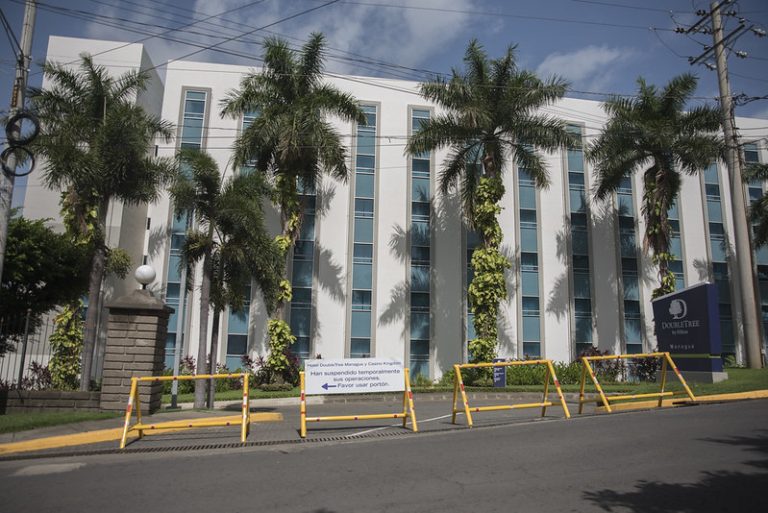25 de junio 2020

Children of Exile: The Births “Sowing Hope” in the Camp of Nicaraguan Farmers

PUBLICIDAD 1M
PUBLICIDAD 4D
PUBLICIDAD 5D
Tourism sector is still at zero, to the point that more than 80% of the staff working in hotels have been suspended or dismissed.

Hit with occupancy rates of less than 3%, the Nicaragua's hotels sector calls out for a prompt reopening of the airport and the return of airlines, allowing the return of business executives who made up a good part of its clientele, before the health crisis joined the political crisis that overwhelmed the country since April 2018, and led to the closure of operations.
An example of this is the old Barcelo Hotel, owned by the Amano International S.A. Group, which became managed by DoubleTree of Hilton, after the contract with Barcelo expired. After announcing its reopening last October 31— after a three million dollars investment—this month, the hotel placed a sign announcing the temporarily closure of its operations.
“Almost all the big hotels are closed. Only two or three are open, with a couple of rooms occupied. They are closed, without that meaning a definite closure,” explained Lucy Valenti, President of National Chamber of Tourism (Canatur).
Hotels —especially those associated with large international chains—, make up an important part of the country’s tourist attraction, because they guarantee that, besides finding natural and cultural destinations to visit, there is also infrastructure of adequate quality.
The economic debacle derived from our sociopolitical crisis, made the tourism sector become one of the most affected. The cancellation of reservations, fueled by the Covid-19 epidemic, propelled it to the top of the list of frustrations, resulting in more closings and layoffs.
“Tourism has a large chain around it: in addition to direct customer service at the hotel or restaurant, there are a large number of companies that provide services to both types of establishments,” says the president of Canatur.
These companies provide, in principle, food and beverages, but also, cleaning services, communication, internet, banking, transportation (passenger and cargo); tour guides; event organizers such as weddings, anniversaries, meetings; and even artisans, who sell their creations in the commercial spaces of many hotels and other visitor locations..
“The tourism sector represents an important income for the country’s gross domestic product, and jobs for thousands of people,” notes Jose Solorzano, partner and manager of the Holiday Inn Convention Center Hotel.
From that position, and in conversations with his peers from the Nicaraguan Hotels Association (Ashotnic), he finds that the only solution to get a breath of air to finances and remove even if partially the ghost of a permanent closure, is “that airports be opened.”
“We cannot continue to be in tenterhooks,” said Solorzano. “We have to let tourism come back in. As we are, we feel like were intubated,” he said.
“The arlines are in meetings with the airport to organize themselves for a possible reopening. Some are saying that perhaps they will return to the country in July, others in August, but all are clear that they will have to implement (health security) protocols that IATA demands, both for planes and for airports,” Valenti describes.
Solorzano fully agrees with the need to guarantee the biological safety of the many common areas in which a passenger moves, and describes that “since the crisis began, in the Hotel Association we have implemented safety and hygiene measures so that guests feel safe.”
In this regard, he assured that since two to three months ago, everyone implemented the security protocol for their facilities. “From that point of view, coming to our hotels is like going to any other hotel in Central America,” he says.
The (red) numbers of the Hotel Association show that between 80% to 85% of the employees are suspended from their work, or were fired, with which a large number of families were left without income, but not only of staff on payroll, but also “many who sold us meat, eggs, drinks…the economic effect of having stopped the tourism sector is gigantic,” noted Solorzano.
This reality does not differ much from the rest of the Canatur-affiliated sector. Valenti said that “we are still at zero. There is no activity. Most tourist companies are closed. Some restaurants survive on delivery, and tour agencies are serving their international contacts from home. The sector is closed, awaiting the end of the voluntary quarantine.”
While that moment comes, Solorzano repeats that “if we want to generate new income, we have to allow tourism to come and international business people to return.”
He said that, at this time, the sector is waiting for the return of airlines such as COPA, TACA, UNITED, Aeromexico… “even if they do not make three flights daily, if they do it twice a week, the flow of tourism will reopen, bringing money to the country,” he insisted.
PUBLICIDAD 3M
Periodista nicaragüense, exiliado en Costa Rica. Durante más de veinte años se ha desempeñado en CONFIDENCIAL como periodista de Economía. Antes trabajó en el semanario La Crónica, el diario La Prensa y El Nuevo Diario. Además, ha publicado en el Diario de Hoy, de El Salvador. Ha ganado en dos ocasiones el Premio a la Excelencia en Periodismo Pedro Joaquín Chamorro Cardenal, en Nicaragua.
PUBLICIDAD 3D